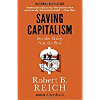
Although it’s still possible to win the lottery (your chance of winning $648 million in the recent Mega Millions sweepstakes was one in 259 million), the biggest lottery of all is what family we’re born into. Our life chances are now determined to an unprecedented degree by the wealth of our parents.
That’s not always been the case. The faith that anyone could move from rags to riches – with enough guts and gumption, hard work and nose to the grindstone – was once at the core of the American Dream.
And equal opportunity was the heart of the American creed. Although imperfectly achieved, that ideal eventually propelled us to overcome legalized segregation by race, and to guarantee civil rights. It fueled efforts to improve all our schools and widen access to higher education. It pushed the nation to help the unemployed, raise the minimum wage, and provide pathways to good jobs. Much of this was financed by taxes on the most fortunate.
But for more than three decades we’ve been going backwards. It’s far more difficult today for a child from a poor family to become a middle-class or wealthy adult. Or even for a middle-class child to become wealthy.
The major reason is widening inequality. The longer the ladder, the harder the climb. America is now more unequal that it’s been for eighty or more years, with the most unequal distribution of income and wealth of all developed nations. Equal opportunity has become a pipe dream.
Rather than respond with policies to reverse the trend and get us back on the road to equal opportunity and widely-shared prosperity, we’ve spent much of the last three decades doing the opposite.
Taxes have been cut on the rich, public schools have deteriorated, higher education has become unaffordable for many, safety nets have been shredded, and the minimum wage has been allowed to drop 30 percent below where it was in 1968, adjusted for inflation.
Congress has just passed a tiny bipartisan budget agreement, and the Federal Reserve has decided to wean the economy off artificially low interest rates. Both decisions reflect Washington’s (and Wall Street’s) assumption that the economy is almost back on track.
But it’s not at all back on the track it was on more than three decades ago.
It’s certainly not on track for the record 4 million Americans now unemployed for more than six months, or for the unprecedented 20 million American children in poverty (we now have the highest rate of child poverty of all developed nations other than Romania), or for the third of all working Americans whose jobs are now part-time or temporary, or for the majority of Americans whose real wages continue to drop.
How can the economy be back on track when 95 percent of the economic gains since the recovery began in 2009 have gone to the richest 1 percent?
The underlying issue is a moral one: What do we owe one another as members of the same society?
Conservatives answer that question by saying it’s a matter of personal choice – of charitable works, philanthropy, and individual acts of kindness joined in “a thousand points of light.”
But that leaves out what we could and should seek to accomplish together as a society. It neglects the organization of our economy, and its social consequences. It minimizes the potential role of democracy in determining the rules of the game, as well as the corruption of democracy by big money. It overlooks our strivings for social justice.
In short, it ducks the meaning of a decent society.
Last month Pope Francis wondered aloud whether “trickle-down theories, which assume that economic growth, encouraged by a free market, will inevitably succeed in bringing about greater justice and inclusiveness…”. Rush Limbaugh accused the Pope of being a Marxist for merely raising the issue.
But the question of how to bring about greater justice and inclusiveness is as American as apple pie. It has animated our efforts for more than a century – during the Progressive Era, the New Deal, the Great Society, and beyond — to make capitalism work for the betterment of all rather merely than the enrichment of a few.
The supply-side, trickle-down, market-fundamentalist views that took root in America in the early 1980s got us fundamentally off track.
To get back to the kind of shared prosperity and upward mobility we once considered normal will require another era of fundamental reform, of both our economy and our democracy.
About the Author
 ROBERT B. REICH, Chancellor’s Professor of Public Policy at the University of California at Berkeley, was Secretary of Labor in the Clinton administration. Time Magazine named him one of the ten most effective cabinet secretaries of the last century. He has written thirteen books, including the best sellers “Aftershock" and “The Work of Nations." His latest, "Beyond Outrage," is now out in paperback. He is also a founding editor of the American Prospect magazine and chairman of Common Cause.
ROBERT B. REICH, Chancellor’s Professor of Public Policy at the University of California at Berkeley, was Secretary of Labor in the Clinton administration. Time Magazine named him one of the ten most effective cabinet secretaries of the last century. He has written thirteen books, including the best sellers “Aftershock" and “The Work of Nations." His latest, "Beyond Outrage," is now out in paperback. He is also a founding editor of the American Prospect magazine and chairman of Common Cause.
Books by Robert Reich
Saving Capitalism: For the Many, Not the Few -- by Robert B. Reich
 America was once celebrated for and defined by its large and prosperous middle class. Now, this middle class is shrinking, a new oligarchy is rising, and the country faces its greatest wealth disparity in eighty years. Why is the economic system that made America strong suddenly failing us, and how can it be fixed?
America was once celebrated for and defined by its large and prosperous middle class. Now, this middle class is shrinking, a new oligarchy is rising, and the country faces its greatest wealth disparity in eighty years. Why is the economic system that made America strong suddenly failing us, and how can it be fixed?
Click here for more info or to order this book on Amazon.
Beyond Outrage: What has gone wrong with our economy and our democracy, and how to fix it -- by Robert B. Reich
 In this timely book, Robert B. Reich argues that nothing good happens in Washington unless citizens are energized and organized to make sure Washington acts in the public good. The first step is to see the big picture. Beyond Outrage connects the dots, showing why the increasing share of income and wealth going to the top has hobbled jobs and growth for everyone else, undermining our democracy; caused Americans to become increasingly cynical about public life; and turned many Americans against one another. He also explains why the proposals of the “regressive right” are dead wrong and provides a clear roadmap of what must be done instead. Here’s a plan for action for everyone who cares about the future of America.
In this timely book, Robert B. Reich argues that nothing good happens in Washington unless citizens are energized and organized to make sure Washington acts in the public good. The first step is to see the big picture. Beyond Outrage connects the dots, showing why the increasing share of income and wealth going to the top has hobbled jobs and growth for everyone else, undermining our democracy; caused Americans to become increasingly cynical about public life; and turned many Americans against one another. He also explains why the proposals of the “regressive right” are dead wrong and provides a clear roadmap of what must be done instead. Here’s a plan for action for everyone who cares about the future of America.
Click here for more info or to order this book on Amazon.




























